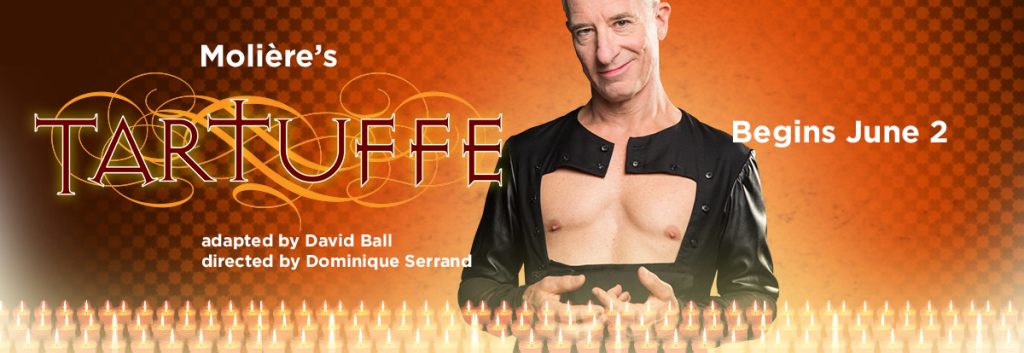A man is a man, he is not an angel nor is he meant to be. Tartuffe is just such a man, and his tale in its tragically comedic entirety can be found at Shakespeare Theatre Company as they finish out their 2014/2015 at Sidney Harman Hall with a co-production of Molière’s iconic production shared by South Coast Repertory and Berkeley Repertory Theatre. Under the Direction of Dominique Serrand, the classic dark comedy is heralded with new enlightenment; a unique amalgamation of the truthful origins blended against David Ball’s adaptation.
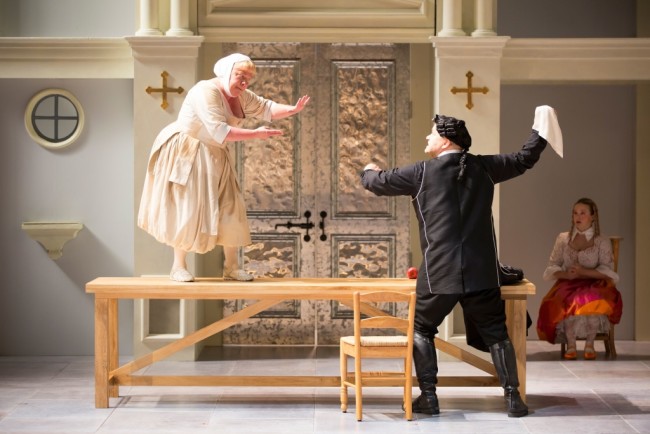
A grandiose set more than suitable for the period consumes the stage of Sidney Harman Hall for this particular production. Conceived by Director Dominique Serrand and Scenic Designer Tom Buderwitz, the glorious interior of Orgon’s home is simplistic in its décor, though lavish in its vertical stature. Serrand and Buderwitz create vertical depth; the illusion of endless vaulted ceilings coming into play with the high walls enclosing the space. The interior color scheme is austere, akin to the dreary shades of reverence often associated with a cloister or monastery. Visually it is striking, setting a tone that matches one half of the performances given as the show falls split between two concepts of the play— one that follows the vein of the original time, its subsequent language and cadence, and a second that is laden thick with modernity. The scenic design work caters to the former of these two notions, creating further discord for when the elements of the more modern work come into play.
Regardless of the show’s modernity or antiquated and breathtaking set, Lighting Designer Marcus Dillard creates extraordinary lighting inside the confines of the home. Despite the candlelit chandelier, the house is lit au natural. Dillard’s focus on side-lighting fabricates the effect of the rising and setting sun quite brilliantly, as if only one face of the house has windows which observe the dawn and the other the dusk. These carefully timed lighting effects fit flawlessly into the descriptors of nightfall and daybreak that occur as the scenes change throughout the performance.
Piety that borders on the line of mockery, which in all honesty best suits Molière’s original intent as described in the introductory apology, is augmented by Sound Designer Corinne Carrillo. Whenever Tartuffe makes a grand gesture, metaphorically or physically, it is accompanied with a deafening choir of holy voices not unlike Carmina Burana. Though it does make its point, it is overused and after a while is a bit like beating the eardrums of the audience into deafness.
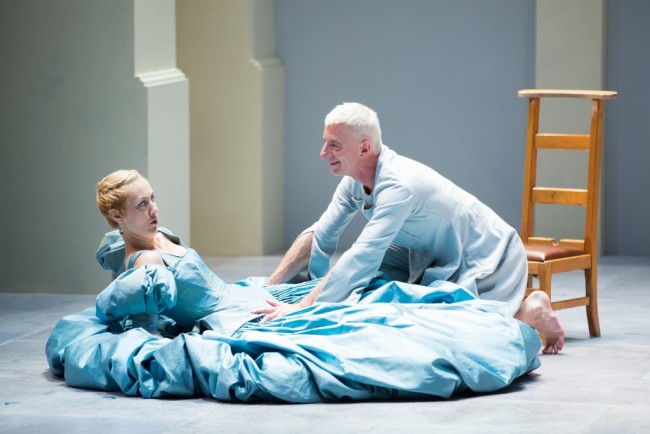
Costume Designer Sonya Berlovitz is another designer on the production team whose creative works lean more toward the Molière traditional play occurring on the stage, though there are curious modern infusions here and there that come about as strangely as the modern aspects of the play’s adaptation. Berlovitz’ most glorious work is reserved not for the ignorant Orgon, the simpering Mariane, or even the speculatively humble Tartuffe but for the lady of the house, Elmire. Her astonishing dresses make her look like royalty; everything from the shiny silk fabric down to the rich gem-tone coloration that fills it. Berlovitz is not lacking in creative style and manages to reflect traits of each character’s personalities into their costumes.
David Ball’s adaptation blurs the line somewhere between Molière’s original work featuring rhyming couplets and a great deal of prose, and a nonchalant deadpan comedy. The apology featured at the beginning of the play— a voice over using Molière’s famous apology for the grotesque humor and dark nature of the play itself— should be realigned to apologize for Ball’s confusion and Director Dominique Serrand’s furtherance of this juxtaposition. There is a rich humor in the text that is often glossed over in favor of physical shtick, which does translate well on the stage but feels like an intellectual penalty for those seeking the subtler nuances of highbrow comedy.
Serrand overdoes the Tartuffe as Christ metaphor as well. This is a secondary instance of symbolically beating the concept into the audience a tad too much. Early on during a scene where Tartuffe is splayed out in a fashion reminiscent to the crucifixion it is mildly amusing. But the repetition of such, particularly the final moments, become redundant and smack of overkill. Serrand’s intention behind Laurent (Nathan Keepers) and the other manservant that follows Tartuffe about is also vague and off-putting. At times these servants act like extraneous extensions of Tartuffe’s emotions and gestures, wriggling about on the floor or enacting physical representations of the words he speaks. In other moments they are actually servants milling about and assisting him in his daily rituals. The juxtaposition of the two concepts does not translate clearly and often times the gestures and wild occurrences of the servants is distracting from the main action and conversation happening around them.
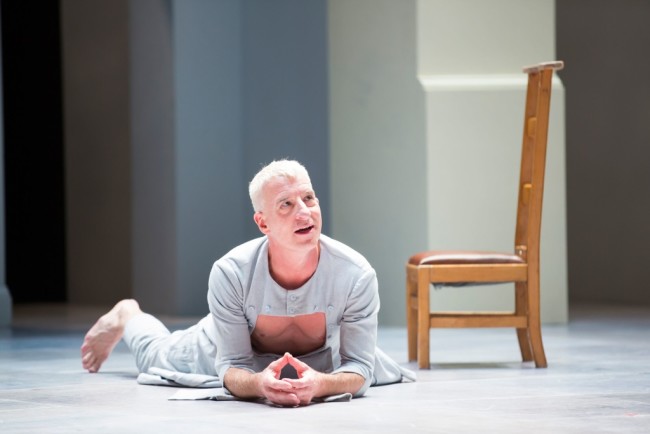
Serrand’s choice of Stephen Epp as the title character is also questionable, not because of Epp’s talent— which is magnificent— but because of his general attractive appearance. There are laborious paragraphs describing the grotesque nature of the man Tartuffe, none of which are ever manifested physically by Epp, which begs the question— if you are going to cast an attractive, chiseled svelt figure to play such a heinous fiend, why would you then not have him acting in a disgusting fashion so that his premise, which upholds the central conceit of the show, is believable? If Serrand had chosen to frame the performance so that it was only being filtered through Orgon’s eyes— as he is the only one that cannot see Tartuffe for what he is— casting Epp without any physical representation of the character’s inherent vile nature would have been acceptable— but as this is not the framework— at least not by any obvious means— the notion that such a man is meant to embody all of these revolting characteristics is too big of a suspension of disbelief to function within the constraints of the production. The crux of the show rides on a villainy that remains unseen.
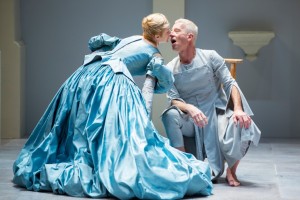
Epp gives a riveting performance if the aforementioned contradiction can be overlooked. Particularly in the initial scene of meeting Elmire (Sofia Jean Gomez) where his entire monologue is an oversexed diatribe aimed directly through her with abstract expressive gestures that result in Epp rolling about on the floor. While the moment is a bit confusing to behold, it is extraordinarily fascinating, watching his words melt into his strangely fluid movements that are underscored with hints of lust and carnal urges. There is an ineffable quality to his continual crafty fashion of speaking, most of which is observed late in the second act when his attempted seduction of Elmire carries on into madness. His upright physicality when walking and praying is a hallmark of the devout that never falters. While most of his dialogue occurs in the vein of the original work, Epp takes liberty with an aside or two that give his character a very modern sound.
Gomez, as the lady sought by Tartuffe, also plays a character whose primary text occurs in the original realm of the play rather than the modern one. Her portrayal is honor bound but she toes a fine line of baiting the unctuous snake that are Tartuffe’s advances. With a venom laced in her words at Orgon, Gomez holds her own as one of only three featured women in the play. Dorine (Suzanne Warmanen) and Mariane (Lenne Klingaman) are the other two featured females and differ drastically from Gomez’ character.
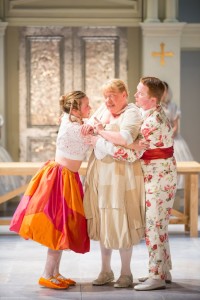
Klingaman plays the dopey ingénue with a vapid vacancy in her head that’s as vibrant as her pink and orange skirts. Stricken with love over the simpering Valere (Christopher Carley), she bares a youthful exuberance in the arena of pleasing her father right until he becomes displeasing to her ear. Paired off against the boisterous house maid the pair are quite spirited; Warmanen possessing the spirit of peppered whiskey while Klingaman is more of a cloyingly saccharine moscato. Both have their moments with the overly affected Carley; the scene where the physical separation and kiss coming to mind. The trio plays this scene exceptionally well together, relying heavily on their physical comedy to carry it through to completion.
It’s Warmanen’s blasted shouting match with Orgon (Luverne Seifert) that showcases her chutzpah and really defines the character as a whole. With salt and pepper in her arsenal, Warmanen does not back down in this scene, which exemplifies her tenacity and Seifert’s ignorant cruelty. Seifert plays one of several characters who is caught straddling the modernity and archaic nature of the production— half his speech reflecting the cadence of the original period, the other delivered with a modern flippancy.
Other notable performances include Madame Pernelle (as played with staunch ferocity by Michael Manuel) and her only two scenes featured in the show. Manuel is as memorable as he is obnoxious and shan’t be skipped credit or praise simply for the brevity of his character’s appearance. Damis (Brian Hostenske) is as hot-headed and foul-tempered as the good Madame is annoying. Though Hostenske’s portrayal is one note, it is a very loud and furious note that drives the slower pace of the scenes in which he participates. Cleante (Gregory Linington) is the only character which is assuredly in the present-day adaptation of the play 100%. His tone is often flippant, his speech pattern flowing with modernity and ease; even his emotions are interpreted with a modern subtly. He succeeds with aplomb in carrying the torch for the non-traditional portions of the play in regards to cadence and rhythm, and should not be discredited simply because he is the only character that speaks as the voice of modern reason.
Despite the great many confusions between the adaptation, interpretation, and overall direction, there is exemplary acting occurring on the stage, and the design elements are indeed striking; worth examining and it does serve to tickle the funny bone several times throughout the evening.
Running Time: 2 hours and 45 minutes with one intermission
Tartuffe plays through July 5, 2015 at Shakespeare Theatre Company in Sidney Harman Hall— 610 F Street NW in Washington, DC. For tickets call the box office at (202) 547-1122 or purchase them online.

